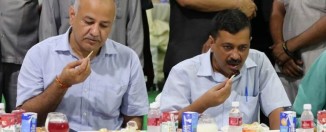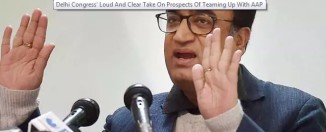A Game that Arvind Kejriwal is Playing on His Own Terms
The AAP has little or nothing to lose and a lot to gain from the DDCA stand-off with Arun Jaitley. But the Narendra Modi government has to contend with the fact that this episode could take off even more sheen from its already dimming allure.
The Rs 10 crore defamation suit filed by Union Minister for Finance Arun Jaitley against Delhi chief minister Arvind Kejriwal is a lawyerly response to what is essentially a political problem.
Kejriwal is not a man who will be rattled by such a suit; if anything, he will feed off it. His party already has a few suits against it. He doesn’t shy from naming names, pointing (and wagging) fingers, saying the unsayable. In the run up to the May 2014 elections, Kejriwal went to Gujarat and ridiculed the development claims of its chief minister Narendra Modi, then campaigning to become the Prime Minister. In his short tenure as Delhi chief minister in the same year, he said he would file a case against Mukesh Ambani over gas pricing.
Now, by saying that Jaitley wanted to scuttle a probe the Delhi government was launching into the affairs of the Delhi and District Cricket Association – which the Union Minister ran as president for 14 years – Kejriwal has done the unthinkable: link the whiff of corruption against a man who has never been accused of financial malfeasance so far. Indeed, Jaitley has rarely received bad press, remaining above the fray even while his party and other senior colleagues come under attack.
Jaitley’s networking skills are legendary; he knows and gets along with everyone. He is the quintessential Lutyens insider – a man who understands power and who knows give and take are critical to keep the wheels of that power moving smoothly. But he is also a well respected lawyer and even if he has no grassroots following, is of tremendous value to his party and more so to the current prime minister. If anything, his skills have not been fully utilised – he would make an ideal Parliamentary Affairs minister who could work with the opposition to ensure that the government could function.
In Kejriwal’s eyes, such a man represents the very establishment that he wants to fight. Kejriwal sees the prevailing power structures as a cosy nexus, where there are public disagreements and arguments but private arrangements and adjustments. His constant railing against the political-corporate nexus has won him a constituency, especially in Delhi, which gave him a resounding victory.
Add to that the Union government’s somewhat clumsy efforts to delineate what the Delhi government can do and cannot as well as the constant skirmishes between Kejriwal and the Lt Governor which have further helped the chief minister paint himself as a crusader. The ham-handed way in which the CBI raids against top Delhi government official Rajendra Kumar were carried out have only helped Kejriwal consolidate this image; he was quick to turn them around, take to the social media and link them to Jaitley’s fear of an inquiry into DDCA. This has also given a second wind to Kirti Azad, the former cricketer and BJP MP, who was not getting much of a media hearing all these years in his campaign against Jaitley’s stewardship of DDCA; now he is all over the media.
This sudden turn of events appear to have blindsided Jaitley who has never had to fight such an assault. Despite internal party feuds, he kept a discreet silence, preferring a straight bat in public rather than hitting out at his BJP rivals. When Sushma Swaraj was under fire for her links with Lalit Modi, Jaitley came out in her support, belying the impression that they were in rival “camps”. At one time he was close to L K Advani; today he is a pillar of the new Modi power structure. But through all this, he has remained unscathed personally and politically.
This is a crisis for him. He has received the support of his party which will stand by him through thick and thin.Narendra Modi’s comment comparing him to L K Advani – “Advaniji jitna pavitra hain, Jaitleyji utna hi hain (Jaitley is as pure as Advani) he told BJP MPs – has been interpreted as a subtle way of telling Jaitley to resign since the BJP patriarch did quit as MP when his name came up in the hawala scam. However, why would Modi want that? Jaitley is one of the few sharp ministers in the cabinet, nudging him out would be counter-productive, unless he himself decides to step down.
Despite any murmurs within the BJP, there will be shows of complete solidarity with him. Modi is not one who likes to be seen as succumbing to pressure – despite all the revelations in the cases of Swaraj and Vasundhara Raje, they were not asked to step down. The storm eventually passed.
In this instance, however, on the one side there is the powerful Modi government and on the other, a minor regional outfit which punches above its weight, at least where public perception is concerned. The latter has little or nothing to lose and a lot to gain; the former has to contend with the fact that this episode could take off even more sheen from its already dimming allure. To fight this battle will require a nuanced response and political strategising of the highest order.






